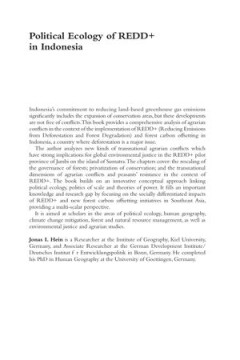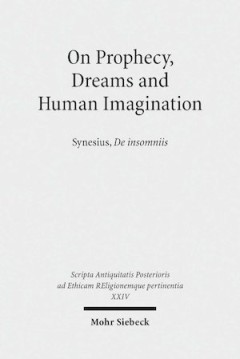Filter by

Political Ecology of REDD+ in Indonesia
Indonesia’s commitment to reducing land-based greenhouse gas emissions significantly includes the expansion of conservation areas, but these developments are not free of conflicts. This book provides a comprehensive analysis of agrarian conflicts in the context of the implementation of REDD+ (Reducing Emissions from Deforestation and Forest Degradation) and forest carbon offsetting in Indones…
- Edition
- -
- ISBN/ISSN
- 9781138479319
- Collation
- -
- Series Title
- -
- Call Number
- -

Oil Spaces: Exploring the Global Petroleumscape
Oil Spaces traces petroleum’s impact through a range of territories from across the world, showing how industrially drilled petroleum and its refined products have played a major role in transforming the built environment in ways that are often not visible or recognized. Over the past century and a half, industrially drilled petroleum has powered factories, built cities, and sustained nation-…
- Edition
- -
- ISBN/ISSN
- 9781000449495
- Collation
- -
- Series Title
- -
- Call Number
- -

Chinese Surplus
What happens when the body becomes art in the age of biotechnological reproduction? In Chinese Surplus Ari Larissa Heinrich examines transnational Chinese aesthetic production to demonstrate how representations of the medically commodified body can illuminate the effects of biopolitical violence and postcolonialism in contemporary life. From the earliest appearance of Frankenstein in China to t…
- Edition
- -
- ISBN/ISSN
- 9781478091035
- Collation
- -
- Series Title
- -
- Call Number
- -

On The Daimonion Of Socrates: Plutarch
Plutarch's dialogue On the daimonion of Socrates is a unique combination of exciting historical romance and serious philosophical and religious discussion. The volume offers a range of essays on themes providing further insights into this masterly literary piece: on the historical, religious and philosophical background and on thematic connections with other works by Plutarch.
- Edition
- -
- ISBN/ISSN
- 9783161501388
- Collation
- -
- Series Title
- -
- Call Number
- -

On Prophecy, Dreams And Human Imagination: Synesius, De Insommniis
Synesius' essay De insomniis ('On Dreams') inquires into the meaning and importance of dreams for human beings and treats themes - most of all the relationship of humans to higher spheres -, which for religiously- and philosophically-minded people are still important today.
- Edition
- -
- ISBN/ISSN
- 9783161524196
- Collation
- -
- Series Title
- -
- Call Number
- -

In Praise Of Asclepius: Aelius Aristides, Selected Prose Hymns
In the second century AD Aelius Aristides wrote eight prose hymns to Greek gods. This volume presents a new edition of the Greek text of four of these hymns (focusing on Asclepius), a new English translation with notes, and a number of essays shedding additional light on these texts from various perspectives.
- Edition
- -
- ISBN/ISSN
- 9783161536595
- Collation
- -
- Series Title
- -
- Call Number
- -

Hacking the Academy
On May 21, 2010, Daniel J. Cohen and Tom Scheinfeldt posted the following provocative questions online:“Can an algorithm edit a journal? Can a library exist without books? Can students build and manage their own learning management platforms? Can a conference be held without a program? Can Twitter replace a scholarly society?”As recently as the mid-2000s, questions like these would have bee…
- Edition
- -
- ISBN/ISSN
- 9780472900251
- Collation
- -
- Series Title
- -
- Call Number
- -

Europäische Lyrik seit der Antike. 14 Vorlesungen
Since ancient Greek-Latin and Judeo-Christian antiquity and also in a constant return to these two traditions the people of Europe have created a great treasure trove of poems. These poems have expressed and shaped the eras of their history. While myth, epic and novel have told the great stories of the world and of the gods, peoples and heroes, the poem created the ego-telling voice at an early…
- Edition
- -
- ISBN/ISSN
- 9783937816142
- Collation
- -
- Series Title
- -
- Call Number
- 302.224 4

Adaptive Strategies for Water Heritage
This Open Access book, building on research initiated by scholars from the Leiden-Delft-Erasmus Centre for Global Heritage and Development (CHGD) and ICOMOS Netherlands, presents multidisciplinary research that connects water to heritage. Through twenty-one chapters it explores landscapes, cities, engineering structures and buildings from around the world. It describes how people have actively …
- Edition
- -
- ISBN/ISSN
- -
- Collation
- -
- Series Title
- -
- Call Number
- 627 HEI a

Physiological Responses to Abiotic and Biotic Stress in Forest Trees
As sessile organisms, plants have to cope with a multitude of natural and anthropogenic forms of stress in their environment. Due to their longevity, this is of particular significance for trees. As a consequence, trees develop an orchestra of resilience and resistance mechanisms to biotic and abiotic stresses in order to support their growth and development in a constantly changing atmospheric…
- Edition
- -
- ISBN/ISSN
- -
- Collation
- -
- Series Title
- -
- Call Number
- 628
 Computer Science, Information & General Works
Computer Science, Information & General Works  Philosophy & Psychology
Philosophy & Psychology  Religion
Religion  Social Sciences
Social Sciences  Language
Language  Pure Science
Pure Science  Applied Sciences
Applied Sciences  Art & Recreation
Art & Recreation  Literature
Literature  History & Geography
History & Geography